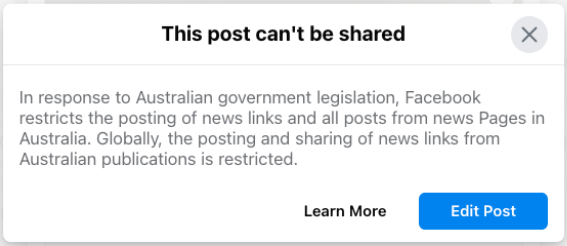As lawmakers in Australia continue to insist on moving forward with legislation to force Facebook to pay publishers for the right to link to their stories, the social network has decided to block users in the country from sharing or viewing news articles on its platform.
On Wednesday, Facebook explained in a blog post that, in its view, Australia’s proposed law “fundamentally misunderstands the relationship between our platform and publishers who use it to share news content.” The root of the misunderstanding? Australian lawmakers think Facebook gives a shit about news on its platform.
According to the statement, news accounts for “less than 4% of the content” people see on their Facebook feed and the law requiring payments to publishers “seeks to penalise Facebook for content it didn’t take or ask for.” In Facebook’s view, it’s the publishers who should be thankful for the “approximately 5.1 billion free referrals” Facebook directed their way in the last year — a service that the social network estimates is “worth an estimated $407 million.”
The proposed legislation is still in the process of being ironed out, in part, because Facebook and Google have been in direct discussions with the government over the past few weeks. Lawmakers’ attitudes have been that these two tech behemoths have gobbled up ad revenue that would have gone to news organisations in years past while the public has come to rely on the platforms as portals to the news. Google’s resistance to the legislation has garnered the most attention as it has threatened to pull out of Australia completely and leave its citizens with nothing but Bing.

But Google seems to be coming around. Just this morning, it was announced that the search giant has made a deal with its long-time nemesis Rupert Murdoch guaranteeing the publisher of the Wall Street Journal, New York Post, and others “significant payments” for the right to share its stories. Earlier this month, Google made deals with at least seven of Australia’s top publishers to include their content in its News Showcase feature.
It’s impossible to say whether Facebook banning the sharing of news content in Australia is good or bad. As with all things related to Mark Zuckerberg’s company, unintended consequences are inevitable. It’s possible that the loss of Facebook as a news resource will encourage users to get outside their bubble and look for news elsewhere. Facebook’s claims that news publishers profit from links in the newsfeed ignores the fact the company has worked to train users to view its social network as a destination for news. The company has also worked directly with publishers to tailor content for the platform, the most infamous example being the “pivot to video” debacle.
But the real-world consequences that have followed the pervasive sharing of disinformation on Facebook may have made news content less desirable for the company’s executives. And now we’re apparently going to get a chance to see what a news-free Facebook is like.
Australia’s population is just shy of 26 million people while Facebook has about 1.85 billion daily active users globally. I’m sorry that my Australian readers have to be the guinea pigs in this experiment but that seems like a nice sample size to find out what effects follow the death of news on the platform. I’m optimistic!
Of course, if Australian publishers start losing a ton of money, they’ll be pressuring those same lawmakers to head back to the negotiating table with Facebook. For now, it’s just nice to see some kind of progress in the debate over the relationship between news and social media.
